At the beginng of 2012 I made some quite accurate SEO predictions so I thought I’d have another go this year and see how accurate they are again at the end of the year. Here are a few predictions that I think/hope will happen at some point in 2013.
1. Restricted API Access
On a couple of occasions in 2012 there has been issues with API access for some large services which have put pressure on businesses to make changes if using these services. The main ones include the Twitter API where their terms of service changed back in August 2012 to make it more restrictive for people using the service.
Another change was how Google cracked down on the usage of the AdWords API by revoking SEOmoz’s access in November andthreatening removing AdWords API access for Raven Tools if they didn’t remove their scraped rankings data.
API access with any service makes it extremely easy to utilise their data by creating more integrated products, services and data intelligence systems. I predict that in 2013 we are going to see a lot more API access restricted throughout 2013 as more people begin to take advantage of this technology, with Google specifically having a large list of APIs they offer.
2. Cross-Device Tracking Becomes a Reality
2012 has been the year where more people are using multiple devices during their purchasing process than ever before. Tracking this behavior is extremely difficult to do accurately due to the technologies all being cookie based for users who aren’t logged in to your website. Access by multiple devices then, in terms of analytics tracking, you are classed as two separate users with no connection at all.
What I would love to see in 2013 is for someone to come up with a solution to this issue and for it to be possible to track across multiple devices during the purchasing funnel. This would enable marketers to fully understand how customers behave and provide data to backup why people need a mobile website, why responsive design is important, how and when people convert, what the assisted conversions are, and all of the other interesting metrics that come along with this type of tracking.
With more and more people being continually logged into Google and Facebook while browsing the web maybe there is a solution to this here to at least provide some useful data across devices. While this is certainly not perfect (and I doubt that any system would ever be!) this could be an interesting step towards understanding the multiple-device purchasing process.
I think this prediction is unlikely to come true, it is more of a ‘fingers crossed’ wish instead!
Image courtesy of Search Engine Land
3. Big Businesses Gain a Deeper Understanding of SEO
Often larger organisations don’t fully understand the bigger picture with SEO. It is often seen as something that is either a one off piece of work or something that you can simply bolt on to projects/websites. A bit like magic really.
With updates like Pengiun and Panda forcing SEOs to look towards the higher quality side of SEO I predict that this will in turn translate into bigger businesses gaining a much deeper understanding of what is involved with SEO. And this is only a good thing.
The better larger organisations understand SEO the more it can be integrated throughout their whole processes to get the best results possible.
4. Google Launches an Integrated Travel Product
With the speed that Google is moving in the travel space I predict that they will launch an integrated travel product which joins up all of their products/services that they have launched over the past couple of years.
Initially it started with purchasing several key businesses in the travel space. This was then used as the basis for creating their own travel products (which were pushed to the top of the SERPs!). The next logical step is to integrate these into something much more useful and that spans across the whole process of booking a holiday or a hotel.
Currently Google have;
- Google Hotel Finder (which contain Google Reviews, Maps, Photos, Videos and Streetview inside the hotel itself)
- Google Flights
- Google Field Trip
I have posted a lot about how Google is entering the travel market over the past couple of years;
- The Travel Industry Must Be Shaking in Their Boots
- Google Hotel Finder Showing In Search Results
- Is Google Turning Into A Hotel Aggregator?
- Travel Dates Becoming More Prominent in Google SERPs
I would be extremely surprised if something like this didn’t launch in 2013. Whatever they launch, I predict that it will be a cross platform device with some kind of social element integrated throughout (Google+ of course!)
Here is what it could look like (okay, I may have gone a little overboard with the ‘book’ buttons…)
5. Google+
I predict that Google announces further spurious statistics about the failing social media platform, Google+. A while back when I attended theGoogle@Manchester Event they mentioned that;
“Google+ as a social network has a total of 400 million users with 100 million of these being active every month.”
According to Wikipedia (so it must be true…) Google has 53,546 employees which would certainly account for around 0.053% of that user base (if my math is correct!). Not quite sure who the rest are though…. For pure amusement and pointless-ness sake, I am going tomake up estimate that each Google employee has convinced 10 of their family/friends to use the social network, of which they have then convinced 2 of their friends to do the same which gives….
- 53,546 Google employees have convinced
- 535,460 of their friends/family to join Google+ who have then convinced a further
- 1,070,920 people to give it a go too.
- This leaves us with a total of, 53,546 + 535,460 + 1,070,920 people who are (in some way) related to Google employees which gives us 1,659,926 people who are using Google+ each month – or 1.65% of the user baseare Google ‘related’
As you can see…these figures are based on extremely scientific and accurate data sources so cannot be questioned in any way  I also imagine that Google came to those figure it announced in a similar scientific way as well..
I also imagine that Google came to those figure it announced in a similar scientific way as well..
6. Forget ‘Big Data’, Businesses Begin to Understand ‘Small Data’
‘Big Data’ – one of the phrases being thrown around throughout 2012. I love data, I am a total geek and love spreadsheets but what I have found is that most businesses struggle to understand small data, let along big data (i.e. think Tesco’s data warehouses for their Clubcard).
I predict that in 2013 businesses are going to get a better understanding of the ‘small data’ that is already available to them and about how this can inform business decisions. There is always so much information available within the data when you are asking ‘it’ (the data) the right questions.
7. Google Jobs Launches
One vertical that Google has left largely untouched so far is the Jobs market. This is a place that is rife with aggregators and, to be fair, a lot of spammy and low quality websites (don’t get me wrong – they aren’t all like that – but there is a lot of junk out there..). This could be an area where Google launch a new Scheme.org/Rich Snippet markup to help Google better understand the jobs that are available.
The next step generally after this happens is that Google create their own vertical to compete against the people who have just handed them the structured data on a plate. While I think Travel and Social are areas that Google is more interested in at present, I wouldn’t be surprised if they begin making moves in this area.
8. Integrated SEO
As I mentioned a little earlier in the prediction for how big business will gain a deeper understanding of SEO, this one follows on from this in the sense that as a greater understanding comes the more integrated SEO becomes throughout the whole organisation. From integrating TV campaigns online, integrating social with other areas of the marketing work and working closer with the PR teams.
I predict that we are going to see much more integrated SEO throughout 2013.
9. Google Monetises More Previously-Free Services
Google currently has a large list of their APIs that are available for people to use. This list has shrunk significantly over the past couple of years which has been due to Google deprecating those APIs or starting to monetise them as they have done with the Google Maps API.
I predict that in 2013 we are going to see Google looking to monetise more of their previously free APIs. It is difficult to say which these could be but some of the more prominent ones could be the YouTube API, Google Webmaster Tools API (this would be a contender after threatening persuading companies such as Raven Tools andSEOmoz to remove scraped data. I imagine next they will be informing them that they can pay to use the rankings data within the Google Webmaster Tools API!).
10. Bing Integrates Search into Other Products
Bing is still one to watch. Last year I predicted that they would gain search engine market share and they did by a small amount. I predict that Bing (or Microsoft specifically) will being to be integrated more and more into other products such as the Xbox and other Windows based devices such as mobile, Surface and other tablets.
Bing has created strategic partnerships with Facebook in the past and to grow further I believe this will be key for them. If Facebook launch their own search platform though, I reserve the right to scrap this prediction all together as this will have a reasonable impact on Bings market share 
11. SEO Role Expands
In the past the SEO role can often be quite isolated and looking at things from an SEO point. With Google updates making old skool SEO much harder to game I predict that the role of an SEO will expand further. While I can’t imagine the role will by hands on in the new areas, I believe the additional responsibilities will be to gain deeper understanding of different business areas which will help the SEO team integrate better within an organisation.
These additional understandings could include PPC, Email and Offline Advertising. This can only be a good thing as a better understanding helps people to think more creatively about how to get the best results possible.
12. Businesses Test AdWords for Non-Commercial Keywords
While not traditionally SEO, but according to the above prediction it could well become a bigger part of the role, I predict that in 2013 Google is going to be pushing people to bid on non-commercial keywords within Google AdWords.
Why? Because it is an additional revenue stream for Google that is largely untapped, with the exception of the Google Grants for non-profit organisations. This will likely be pushed more as multi-touch point analysis becomes easier to track. Imagine if you placed an advert for the keyword “Best places to visit in Bangkok” and landed the person on a travel guide style piece of content. Then if you are also advertising for things such as “Bangkok Hotels” then is this user more likely to purchase the product with you as they have come across your brand before? Or not?
The cost per click for commercial keywords is always growing as more people start to bid on them, so I predict that we are going to see more people testing this type of advertising to generate a higher return on investment.
13. Links Become Even Harder to Game
While Google has been making a lot of changes in relation to links over the past 12 months, I predict we are going to see an even greater change for links throughout 2013. Matt Cutts has already mentioned about how Google ‘may’ target infographic websites as these aren’t really endorsements for your website. While I disagree with this for high quality infographic websites, I can understand where he is coming from as there are a lot of junky infographic websites out there.
Google has also mentioned about how guest blogging trend hasn’t been the highest quality in the past and has been done more for the link value than anything else. With working in SEO you certainly come across enough websites while trawling the web to fully understand what he means. I predict that we are going to see a lot less value passed from these types of websites in the future as often they are a bunch of niche websites owned by the same person who is charging for posting. Ultimately, this is just a glorified link wheel with content and no real added value to anyone.
Overall in relation to links I predict that Google is going to crack down on medium quality links and really push people to think about real world and valuable links.
14. Google’s Pet Panda Goes to Sleep….for a while
I predict that in 2013 Google Panda will become a thing of the past, everyone who has been hit has been hit already for low quality content. Instead this algorithm update will simply be incorporated into the normal search engine algorithm. While I don’t think this is the last we will see with Google targeting low quality content, it will be less prominent throughout 2013.
Who knows what the next big algorithm update will be called, I’m going to hedge my bets on…..The Google Puffin Update. (Black & White = Check. Animal = Check. Begins with P = Check.)
15. Delayed SEO Becomes a Reality
Back in August Bill Slawski did a post about ‘Transition Rank‘ which is a new patent owned by Google which is about delaying the algorithm to make it harder to understand what is happening. I predict that in 2013 Google will announce the implementation of their ‘delayed response’ algorithm that they applied for a patent with earlier in the year.
This will make it much harder to track direct results from specific pieces of work that has been undertaken. This type of change could also contribute towards the SEO role becoming more diverse as it turns more into a marketing role.
16. Web Analytics Tools Become Even More Inaccurate
I predict that in 2013 we are going to witness analytical blindness as (not provided) reaches insane levels. Analytical blindness, not in the sense that there is too much data, but in the sense that there simply isn’t anything we can see there! Some reports are showing (not provided) data anywhere from 40% to 60% of traffic. I know on my blog the levels are currently at around, 60% of organic traffic is (not provided) and while this is going to be higher based on the content of the blog, but it is a signal to where things are heading for everyone.
In addition to Google’s (not provided) data scandal, there are also issues with iOS6 users on the iPhone with their data being automatically encrypted which means…..you guessed it….more (not provided) data.
Tracking results accurately is becoming a joke and being made harder and harder. I predict that in 2013 things are only going to get more difficult.
17. Increased Focus For User Generated Content
I predict that in 2013 user generated content will become a priority as brands struggle to keep up with the requirements for on-going high quality unique and relevant content needed to help sustain rankings. It is clear that several top brands are starting to understand this and have begun engaging a lot more with their customers in better ways than just having a conversation over social media, instead people are starting to use those brand advocates in a way to generate content for them – usually after some kind of incentive.
User generated content can be such a powerful thing when there is simply too much information for one team of people to write about. Content creation is a large resource which is extremely important to have and if you can use your audience as an addition to this work then it is a winning combination. I predict that we are doing to see an increase in this type of content creation through 2013.
Happy 2013 Everyone! 
2 thoughts on “17 Of My 2013 SEO Predictions”
Michael Cropper
Latest posts by Michael Cropper (see all)
- WGET for Windows - April 10, 2025
- How to Setup Your Local Development Environment for Java Using Apache NetBeans and Apache Tomcat - December 1, 2023
- MySQL Recursive Queries – MySQL While Loops – Fill Zero Sum Dates Between Dates - October 6, 2023











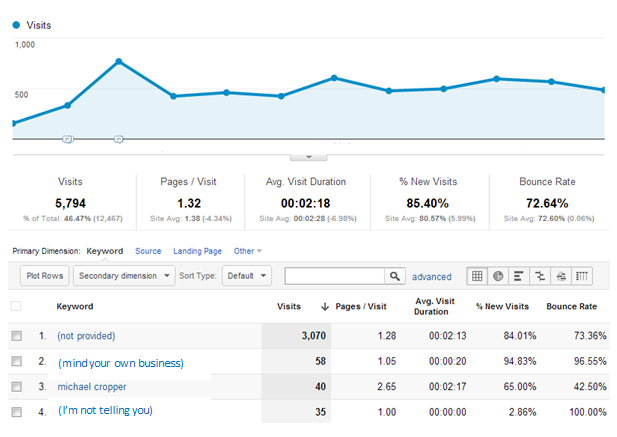

Some Great Predictions, many of which are already turning into reality, For example the Delayed ranking algorithm is already being witnessed. The predictions for Unified Google Travel Products might or might not become a reality as then it will highly devalue the search neutrality of Google. Though Google Jobs might be a reality, but we have not seen even a slight bit of indications on this. The most interesting part of your article is the insistence of small data which i interpret as analyzing already available data at micro level or user life cycle level.
Hi Ved,
Thanks for the comments. For your comment about the ‘small data’ trend, yes this is all about getting people to analyse the data that is already available to people.
As a simple example, within Google Analytics it is possible to segment brand and non-brand traffic. From this you can then identify the differences in conversion rate and ultimately the revenue/profit this generates. Then it would be possible to see if there are any marketing campaigns that could ultimately make pay for their self, such as, “if we can convert 10 people into liking our brand and drive traffic to our website, then they are going to convert at y% more, which means that we would make £z in revenue/profit – hey, that is more than the cost of the campaign!”
It is really simple stuff to do and in my experience it is just something that isn’t often looked at to help with the decision making processes